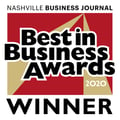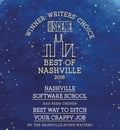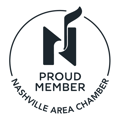There’s a common misconception that if you are creative, you will not like coding. The reality is that many of our students come from creative backgrounds. Whether you are a musician, writer, graphic designer, or express your creativity in other ways, you can bring your creativity into your role as a software developer. Today we meet Sorrel Brigman, an audio engineer, and Ashley Irwin, a writer, from Cohort 17 who both use their creativity to code.
Sorrel Brigman
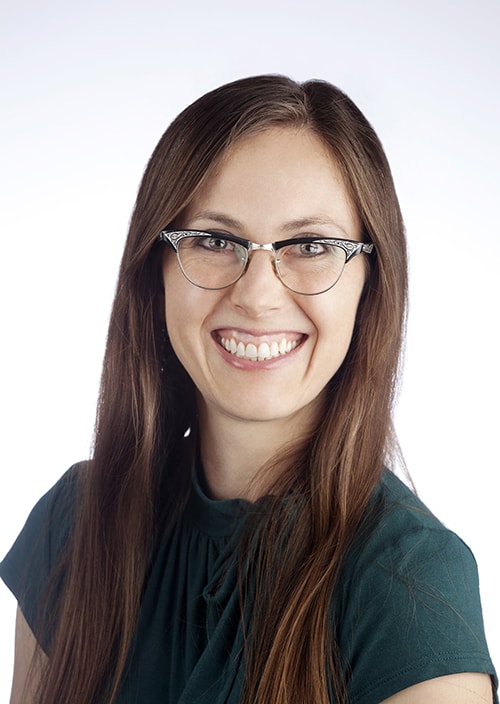 Sorrel found her first passion back in high school when she got involved with audio engineering. She spent 6-7 years in Nashville as an audio engineer working on some awesome projects like Chris Stapleton’s first album. After a few years in the industry, she realized that she had hit her professional ceiling. So when the studio she worked at closed, Sorrel decided that she wanted to find a career where she could continue to learn and grow. Her husband was teaching himself Swift and recommended she give it a try. Sorrel did an online tutorial for Java and found coding to be similar to audio engineering. She explains that in both coding and audio engineering you take the different pieces and put them together into a system to create the outcome that is desired. Sorrel found that both offer “a beautiful mix of technology and creativity,” but the growth opportunities with software development are almost limitless. Plus, she doesn’t have to sweep the studio floor afterwards. She was sold.
Sorrel found her first passion back in high school when she got involved with audio engineering. She spent 6-7 years in Nashville as an audio engineer working on some awesome projects like Chris Stapleton’s first album. After a few years in the industry, she realized that she had hit her professional ceiling. So when the studio she worked at closed, Sorrel decided that she wanted to find a career where she could continue to learn and grow. Her husband was teaching himself Swift and recommended she give it a try. Sorrel did an online tutorial for Java and found coding to be similar to audio engineering. She explains that in both coding and audio engineering you take the different pieces and put them together into a system to create the outcome that is desired. Sorrel found that both offer “a beautiful mix of technology and creativity,” but the growth opportunities with software development are almost limitless. Plus, she doesn’t have to sweep the studio floor afterwards. She was sold.
Sorrel researched her options and initially considered getting a computer science degree from from a community college. However the 2-3 year timeline wasn’t attractive. She also looked at several bootcamps and ultimately decided on NSS after attending an info session. She shared, “I was quite impressed with John Wark’s strong feelings in seeing his role as helping people find jobs.”
Sorrel had many favorite moments throughout her time at NSS. She came to understand and appreciate that coding is a team sport and that you will be solving problems that seem unsolvable all the time. She explained, “Almost every new concept or implementation of a new concept often started with a ‘How the heck am I ever going to do that?’” It often ended with not only completing the initial implementation, but exceeding it. Sorrel experienced several moments of overcoming roadblocks and was strengthened by working with teams, asking questions, and even checking Stack Overflow for solutions.
To code is to be a part of a community, and that’s pretty awesome.
Sorrel encourages future students to focus on their own journeys. She shared, “Your coding journey is YOUR journey.” Everyone comes in with a different level of experience and their learning curves are not the same. Focus on your exercises and your own learning and you’ll be okay. “Don’t worry about anyone else, just worry about you and spending all your effort on learning the material in front of you,” she said. “You have to work at it. NSS has a great reputation in the community, but that alone won’t get you a job. You need to be devoting time to the material and actually working on it. Crush candy later.”
For her front-end capstone, Sorrel built a site called Larger Local. As a fan of local products, she created a site that features user curated products from local small businesses that can then be shared with people outside of the area. Sorrel walked us through the process of building Larger Local:
Utilizing Firebase for my backend, I created a site where users can view products by popularity, upvote them, flag products to be removed from the collection, add new products to the site, and follow links to the purchase the products and learn about the company behind the products. I utilized AngularJS and MaterializeCSS. I created a basic site and liked it, but the form for the user to enter a new product was less than user friendly. Wanting to make adding a product a more user friendly experience, I utilized the Amazon Affiliate Product API, allowing users to add products from Amazon with much more ease. The Amazon Affiliate Product API had several challenges of its own, leading me to get into Node.js a little before the rest of my classmates in order to handle the encryption their API calls require. The final result is a product I'm quite proud of.
Have you ever been given a restaurant recommendation only to discover that you didn’t like the restaurant at all? Sorrel’s back-end capstone solves this dilemma. Similar Tastes Nashville allows a user to submit a restaurant name that they feel passionate about (either you love it or hate it). It then returns a list of restaurants that you might like by comparing your “review” to Yelp reviews. Here is how she built Simple Tastes Nashville:
Similar Tastes Nashville establishes a baseline of what a user's "tastes" are, and then only recommend restaurants users with similar tastes have recommended. I looked to Yelp for my dataset, but unfortunately their API was 1) discontinued the month before and 2) didn't have all the information I wanted anyway. With that in mind, I learned about web scraping using Cheerio.js and scraped restaurant and restaurant review information from Yelp (from their top 500 Nashville restaurants (according to them)) and saved it, later putting it into PostgreSQL database. I was able to collect over 100,000 datapoint (almost 90K reviews and over 40K users). From there, I built a node backend (with Postgres, Knex, Bookshelf and Express). I then created a UI with Angular, Bootstrap, and utilized my own API in order to assess a user's tastes (based on what a user picks regarding a restaurant they either love or hate) and from there recommending 5 restaurants they should like, and predicting their rating of other restaurants one at a time.
Sorrel has been staying busy since the end of bootcamp and recently started her first job as a developer. She has several ideas she wants to work on for her capstones, including rewriting Similar Tastes in React Native and adding additional search features. She also wants to learn about AngularJS components and Angular 2.0. Look for her at the next meetup!
Listen to Sorrel’s interview with Clark Buckner about her journey and check out Sorrel’s profile.
Ashley Irwin
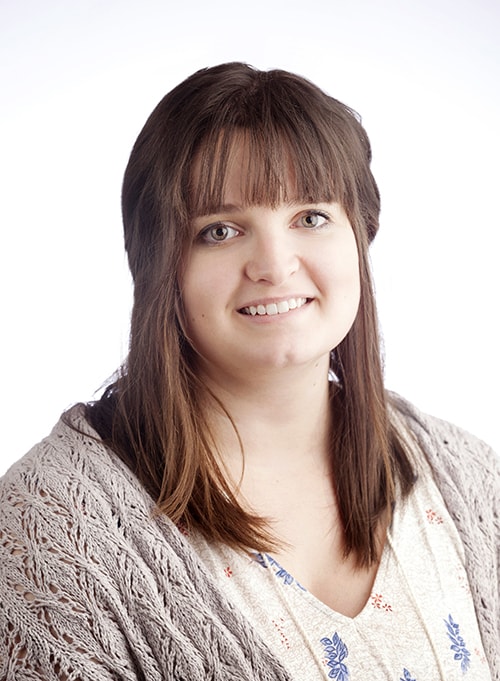 Since Ashley was very young, reading and writing had been her passions. After graduating college, Ashley was working as a freelance writer, but she wanted something more. She heard about NSS from a couple of friends who had graduated and loved their careers now (her dad’s a programmer too). They shared with her how challenging, and yet rewarding, the experience was for them. She started by checking out a few courses on Codecademy and felt the skills she learned as an English Literature major in college would translate to coding. She explained that when you’re reading a book, writing essays, and discussing them, you have to look at the big picture and the tiny details. You do this in code as well.
Since Ashley was very young, reading and writing had been her passions. After graduating college, Ashley was working as a freelance writer, but she wanted something more. She heard about NSS from a couple of friends who had graduated and loved their careers now (her dad’s a programmer too). They shared with her how challenging, and yet rewarding, the experience was for them. She started by checking out a few courses on Codecademy and felt the skills she learned as an English Literature major in college would translate to coding. She explained that when you’re reading a book, writing essays, and discussing them, you have to look at the big picture and the tiny details. You do this in code as well.
Her friends had told her to expect challenges and she found them. Ashley shared, “It was tough trying to keep up when I felt like I was falling behind. It wasn’t always easy to push forward, but I always ended up on my feet if I just kept going.”
Her favorite part of the bootcamp was completing her two capstones.
It was so rewarding to complete two projects from scratch by myself. The capstones are a right of passage proving that you stuck it out.
Ashley encourages students pay attention to the advice of your instructors and trust the process, even when it’s hard.
For her front-end capstone, Ashley created a sleek web app for readers to track the books they’ve read, called Bookshelf. She built it with AngularJS and used Firebase as a real-time database. She also utilized the Google Books API and enjoyed the challenge of integrating it into her app and deciding what information to call for.
Ashley’s back-end capstone was inspired by her sister who does field excavations and takes all her notes and data on paper. Field Notes allows researchers to upload their data directly from the survey site. The app was built with a Postgres database, Express, Knex, and the Bookshelf ORM to manage field note entries.
Ashley is currently adding version 2 features to her capstone projects and perfecting her portfolio website. You’ll also see her at meetups around town.
Listen to Ashley’s interview with Clark Buckner about her capstones and check out Ashley’s profile.
Do you want to give web development a try before committing to a bootcamp? Check out our Web Development Jumpstart program.
Be sure to listen to all of the graduates talk to our friend, Clark Buckner, about their journey into development and about their experience at NSS.
Check out all of the recent grads on the Cohort 17 class website.




